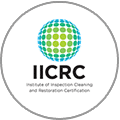If you suspect mold in your home, it’s vital to understand the potential health risks. Mold can cause a range of health problems, particularly for those with pre-existing respiratory conditions or weakened immune systems.
But is it safe to stay in a house with mold? The answer is not straightforward and depends on several factors. In this section, we’ll examine the risks associated with mold in your home and address the question of whether it’s safe to stay with mold.
Key Takeaways:
- Mold in your home can lead to health problems, especially for those with respiratory issues or weakened immune systems.
- Whether it’s safe to stay in a mold-infested house depends on several factors, including the type and extent of the mold growth.
- If you suspect mold in your home, seek professional assistance to assess and remediate the issue promptly.
Understanding the Dangers of Household Mold
Household mold can be dangerous and poses various risks to your health, especially if you have prolonged exposure to it. The dangers of household mold can range from minor allergic reactions to severe, long-term health problems. It is essential to know the risks associated with mold and how to prevent exposure to ensure your well-being.
Inhaling mold spores can cause respiratory problems, especially if you have allergies or asthma. It can trigger asthma attacks and result in symptoms such as wheezing, coughing, and shortness of breath. Prolonged exposure to mold can also lead to the development of other respiratory conditions, such as bronchitis and pneumonia.
Household mold is also known to cause irritation to the eyes, nose, and throat. You may experience symptoms such as red, itchy eyes, runny nose, and sore throat. It may also cause rashes and skin irritation if you come into direct contact with mold.
Individuals with pre-existing health conditions are particularly vulnerable to the health effects of mold exposure. Those with weakened immune systems, respiratory diseases, or allergies are more susceptible to the adverse effects of mold.
Furthermore, toxic molds such as Stachybotrys are capable of producing mycotoxins that can cause serious health problems. Exposure to these toxins can result in headaches, dizziness, memory loss, and even damage to internal organs such as the liver and kidneys. The effects of mycotoxins are long-lasting and can take years to manifest in some individuals.
To prevent the health risks of mold exposure, it is essential to identify and remove any mold growth in your home promptly. Additionally, proper ventilation and moisture control can also prevent the growth of mold in the first place.
Is it Safe to Stay in a House with Mold?
If you suspect mold growth in your home, you may be wondering whether it is safe to stay. The answer depends on several factors.
The type and extent of mold growth is a crucial consideration. Some types of mold can cause severe health issues, while others may have minimal impacts. Additionally, the concentration of mold spores in the air can vary depending on the level of mold growth. If the concentration is too high, it can lead to respiratory problems.
Your individual sensitivity to mold is another factor to consider. Some people are more sensitive to mold than others, and they may experience more severe symptoms after exposure. If you have pre-existing health conditions, such as asthma or allergies, you may be at higher risk for experiencing adverse health effects.
Finally, the overall condition of the house is essential to consider. If the mold growth is extensive and has caused structural damage, it may not be safe to stay in the house until the issue is resolved.
Overall, the decision to stay in a mold-infested house should depend on a careful assessment of the factors mentioned above. If you are uncertain, it is best to consult with a professional experienced in mold remediation to determine the appropriate course of action.
Health Implications of Staying in a Mold-Infested House
Mold in your home isn’t simply an aesthetic issue; it can be detrimental to your health, especially if you remain in the mold-infested house for a long time. Prolonged mold exposure can trigger a range of health problems, including skin irritation, nasal congestion, and eye irritation.
Additionally, mold inhalation can produce more severe respiratory symptoms, particularly in individuals with asthma, allergies, or other respiratory issues. Symptoms such as coughing, wheezing, chest tightness, and shortness of breath can arise from mold exposure, and in some cases, severe reactions can lead to hospitalization.
Furthermore, staying in a mold-infested house for an extended period can cause chronic health problems. It can have a long-term impact on your respiratory system and overall health, causing respiratory infections or aggravating existing medical conditions.
Therefore, it is critical to take mold growth seriously and address it promptly to prevent long-term health implications. Seek professional assistance to identify and remediate mold growth in your home to mitigate the risk of adverse health effects.
| Common Symptoms of Mold Exposure | Long-Term Effects of Staying in a Mold-Infested House |
|---|---|
| Skin irritation | Respiratory infections |
| Eye irritation | Aggravation of existing medical conditions |
| Nasal congestion | Chronic respiratory symptoms |
| Coughing and wheezing | Hospitalization (severe reactions) |
Conclusion
In conclusion, it is vital to recognize the health risks associated with household mold and make informed decisions about staying in a mold-infested house. Although it might be possible to stay in such a house temporarily, long-term exposure to mold can have severe implications for your health.
Therefore, it is crucial to seek professional assistance if you suspect mold growth in your home. They can assess the situation, identify the type and extent of mold growth, and remediate the issue promptly, minimizing your exposure to mold and preventing any health hazards it may cause.
Remember, protecting your health and wellbeing should always be a top priority, and taking necessary measures to prevent mold growth and remediate it promptly can provide peace of mind and ensure a safe and healthy living environment.
FAQ
What are the potential health risks associated with mold in your home?
Mold in your home can pose various health risks. Exposure to mold spores can cause allergic reactions, such as sneezing, coughing, and watery eyes. It can also trigger asthma attacks in individuals with asthma. Prolonged exposure to mold may lead to more severe respiratory issues and other health problems.
Is it safe to stay in a house with mold?
It is generally not safe to stay in a house with mold. The presence of mold indicates an underlying moisture problem, which can contribute to the growth and spread of mold. Prolonged exposure to mold can have adverse health effects, especially for individuals with allergies, asthma, or compromised immune systems. It is crucial to address the mold issue promptly and seek professional remediation.
What determines the level of safety when staying in a house with mold?
Several factors determine the level of safety when staying in a house with mold. These include the type and extent of mold growth, individual sensitivities to mold, and the overall condition of the house. It is essential to consult with professionals to assess the mold situation and determine the necessary steps for remediation and safety.
What are the potential health implications of staying in a mold-infested house long-term?
Staying in a mold-infested house long-term can have severe health implications. Prolonged mold exposure may lead to chronic respiratory issues, persistent allergy symptoms, and increased susceptibility to respiratory infections. It can also worsen existing health conditions, such as asthma and allergies. It is necessary to address the mold problem and ensure a mold-free living environment.






